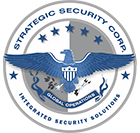DHS TSA SPP Multiple Award IDIQ
Transportation Security Administration Screening partnership program
 IDIQ Contract #: 70T05021D5900N010
IDIQ Contract #: 70T05021D5900N010
Contract Period: April 26, 2021 through May 31, 2026
Business Size: Woman Owned Small Business
About the TSA Screening Partnership Program:
TSA protects the Nation’s transportation systems to ensure freedom of movement for people and commerce. The Screening Partnership Program (SPP) contracts security screening services at commercial airports to qualified private companies. SPP contracts private firms to screen passengers and baggage (including cargo screened as baggage) at commercial airports for explosives, weapons, and other prohibited items through the use of a private, contract screening workforce under Federal oversight.
The five-year contract allows federal customers to efficiently purchase Security Services including:
- Passenger and Baggage Screening,
- Security Training,
- Canine Teams for Narcotics and Explosive Detection
Commercial airports interested in applying for the program may submit an application to the local airport Federal Security Director or can find more information by contacting SSC directly at info@sscctu.com.
Benefits of participation include:
- Screening persons entering designated security areas;
- Screening baggage and other items entering designated security areas;
- Travel document checking (TDC);
- Executing security activities on and off airport grounds, also known as Layered Security
- Programs, such as Advanced Threat Local Area Strategy (ATLAS) activities and Visible
- Intermodal Prevention and Response (VIPR) screening, and screening of passengers by
- Behavior Detection & Analysis (BDA);
- Security training;
- Preventative maintenance of designated screening equipment;
- Temporary screening for pilots and surge requirements (as needed); and
- Screening workforce management.
Congress established TSA through the Aviation and Transportation Security Act (ATSA) (P.L. 107-71), which designated passenger screening as a Federal responsibility. Included in ATSA was language authorizing a pilot program for privatized passenger screening at five airports of different sizes and risk categories. As part of the pilot, TSA entered into contracts with qualified private companies to conduct screening services with federal oversight from TSA officials. Characteristics of the pilot included guidelines for private companies to maintain qualification standards set by TSA for Federal Transportation Security Officers (TSOs) and standards to provide personnel compensation and benefits at an equivalent level of those provided to their federal employee counterparts.
The Federal Aviation Administration (FAA) Modernization and Reform Act of 2012 (P.L. 112-95) provided guidelines for the program, including standards for an SPP application, a timeline for agency action on applications, and steps TSA must take if denying an application. Under section 830, the statute also requires TSA to ensure that approving an airport operator’s application would not compromise the security or detrimentally affect the cost-efficiency or the effectiveness of the screening of passengers or property at the airport” (49 U.S.C. 44920(b)).
TSA maintains overall responsibility for transportation security whether an airport operator has private or federal employees conducting passenger screening operations. Federal Security Directors oversee the contracted security screening operations to ensure compliance with Federal security standards.



